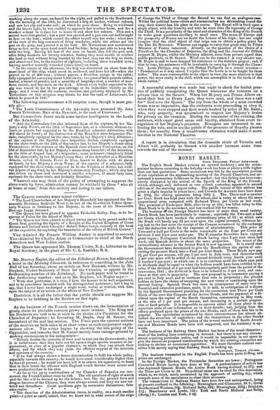As the business of the French session draws on, the
fermentation of gossip about its probable contests grows more intense. The King and his Ministers are said to be at odds in the choice of a President for the Chamber of Deputies ; he favouring M. Dupin, they M. Sauzet, the incumbent of the seat last session. The Times puts the current notions of the motives on both sides in as clear terms as such conjectural expla- nations allow. The writer begins by showing the idle policy of the
• Opposition, and remarks that M. Guizot merely loses vantage-ground by snaking concessions to his antagonists-
" Nobody doubts the sincerity of their zeal to turn out the Government ; but it is unfortunate that they have not hit upon a single specific measure ot mm • provement, or even of a popular character, to which they can attach their efforts, and for which they may claim the efficient support of the interests
and opinions of the country. •
" If he had always shown a firmer determination to fulfil his whole policy, especially towards this country, he would have stood considerably higher than he does at present ; he would not have left it to others, his opponents, to boast that in their hands the alliance with England would become more secure and more productive than in his own. " As far as the party combinations of the Chamber of Deputies are con- cerned, the French Cabinet runs no risk. The old questions of right of search and the like will be dressed up for the debate; but, like the painted forts and aragon-banners of the Chinese, they were always unreal, and they are now tat- tered and threadbare. Great questions gain by successive discussions; false
ones expire. • • • "The duration of the Administration turns, in reality, on a much smaller point—a point so small, indeed, that we know not in what corner of the reign
of George the Third or George the Second we can and an analogous case. Whilst the political horse-riders and scaramouches are skirmishing round the ring, their master bas his place in the centre. The Royal will is fixed upon single object, with the tenacity and with far more than the ingenuity of George- the Third. It is a peculiarity of the mind and character of the King of the French to make great questions ancillary to small ones. The peace of Europe and the prosperity of France are no doubt the honour of his reign; but one might imagine that the chief object of that reign was to obtain a paltry grant for the Doc De Nemours. Whoever can engage to carry that grant may be Prime Minister of France tomorrow. Already, on the question of the choice of a President for the Chamber of Deputies, the King and the Journal des DEbats support M. Dupin, whilst the Ministry adheres, more from private regard than public gratitude, to M. Sauzet. What can be the reason ? A very slender one. M. Dupin is said to have dropped his resistance to the dotation project ; and, if that be true, his assistance will be invaluable in carrying it through the Cham- ber. Louis Philippe may say with Bishop Phillpotts on a recent occasion- ' Paradoxical as it may sound, I rejoice that the battle is to be fought for these trifles.' The more contemptible is the object in view, the more absolute is that power, the more crafty is the skill, which can accomplish it in the teeth of the whole nation."






















 Previous page
Previous page